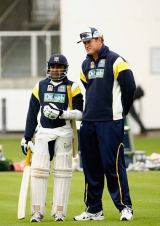
|

Though Sri Lanka's World Cup campaign ended depressingly, they won the respect of a nation that craved a distraction from the troubles that have blighted the country during the last two years
© AFP
|
|
Sri Lanka's World Cup campaign ended depressingly. First, monsoon rains lashed the island, dampening party spirits, then Adam Gilchrist went berserk and, finally, just when Sri Lanka appeared to be dragging themselves back into the contest, the Tamil Tigers launched an air raid on installations on the fringes of Colombo, plunging the city into darkness, turning off televisions and lighting up the night not with celebratory fireworks but flashes of gunfire, a chilling reality check.
For seven weeks Sri Lankan fans watched with increased excitement as Mahela Jayawardene's men cannily navigated their way through to the final. During the process, they won the respect of a nation that craved a distraction from the troubles that have blighted Sri Lanka during the last two years: the tsunami, the slide back into war, the deteriorating human rights situation, the faltering economy. The cricketers, showing professionalism, passion and total commitment, were a beacon of hope.
The Sri Lankan government announced a special postage stamp collection to mark their exploits. Corporates filled the newspapers with full page adverts thanking the team.
It was a heartwarming response to a two-year campaign that came within a
Gilchrist's blade of success. Australia deserved to win, but Sri Lanka were
the closest to them and, after several years in the doldrums, their cricket
was back on track with a team that is unified in approach, multi-skilled and
versatile, mentally strong and shrewdly led. For the first time in Sri
Lanka's history they really do have a team that has consistency within its
grasp and the capability of prospering aboard.
The two chief architects of this turnaround were Tom Moody and Jayawardene, two men whose calm and friendly exteriors hid an inner steeliness. There were other significant contributors along the way - including Asantha de Mel, the chairman of the selectors, a talented and dedicated backroom team, new stars like Lasith Malinga and Chamara Silva, and a cricket board that kept petty politics to a minimum - but Moody and Jayawardene were the centrifugal forces.
 Jayawardene helped the team become more proactive, returning to their attacking roots
Jayawardene helped the team become more proactive, returning to their attacking roots
 |
Assuming he does leave for Western Australia - which sadly seems inevitable - Moody will be remembered for ushering in a new positive approach and pushing players out of their comfort zones. All the players were coaxed out of cruise control and encouraged to embrace a new culture of self-improvement. Moody's public face has been relaxed, down-to-earth and friendly, but, behind the scenes, he pushed buttons and asked questions.
But Moody was not a one-man band. He undoubtedly played a crucial part, building a brilliant management team and setting-out a clear road map for success, but it would not have been possible without a unified team and strong leadership from Jayawardene. His captaincy has been a revelation: adventurous, innovative and, at times, inspired. Sanath Jayasuriya and Marvan Atapattu had their good moments in charge between 1999 and 2006, but Jayawardene has added an extra dimension.
There were plenty of skeptics when he was elevated to the helm in February 2006 - just three months after being stripped of the vice-captaincy - but fears that he would wilt under the extra responsibility were soon quashed. The leadership revitalised his batting, allowing him to lead by example. Behind the scenes he quickly healed a fractious dressing room. One of the keys to Jayawardene's success has been his acceptance that public criticism could not be avoided. He realized that captaining Sri Lanka was not a popularity contest. His decision-making had to be rational, honest and ruthless. Making everyone happy was a self-defeating objective. Unlike some of his predecessors, he was prepared to take bold decisions in the interests of the team - even if that meant being crucified in the media.
This refusal to play political games quickly helped him win the respect of his players. The youngsters respected his single-minded faith in their ability. Seniors respected the fact that everyone was treated with equanimity. Their vast experience was acknowledged, respected and utilised, but no player received special treatment under Jayawardene. He is fair, honest and very tough - far tougher than his boyish looks suggest.

|

Tom Moody and Jayawardene, two men whose calm and friendly exteriors hid an inner steeliness, were at the nucleus of a dramatic turnaround
© Getty Images
|
|
Jayawardene's man-management skills gelled the team while on the field he also brought an innovative and attacking style. For too long Sri Lanka had forgotten their strengths, becoming evermore reactive in their approach. Jayawardene helped the team become more proactive, returning to their attacking roots. His mantra has been "our brand of cricket" and this means playing cricket with passion, flair and commitment. He persuaded his team to enjoy their cricket.
Together, Jayawardene and Moody forged a strong partnership. In all core areas there was total agreement: the need to be fitter and razor-sharp in the field; the necessity for a team culture that embraced self-analysis and constructive criticism; the value of honesty, egalitarianism and perseverance for team-building; and the requirement for players that were mentally strong and committed to the team's cause.
They did not leave the World Cup as winners but they did not leave empty-handed either. The team now has greater self belief than any time in its history. It is driven by a professionalism and unity of purpose that will drive them forward over the coming years. And it has a core of talented young players that can be the engine room of their 2011 campaign - which, by the way, has already started.
Charlie Austin is Cricinfo's Sri Lankan correspondent



